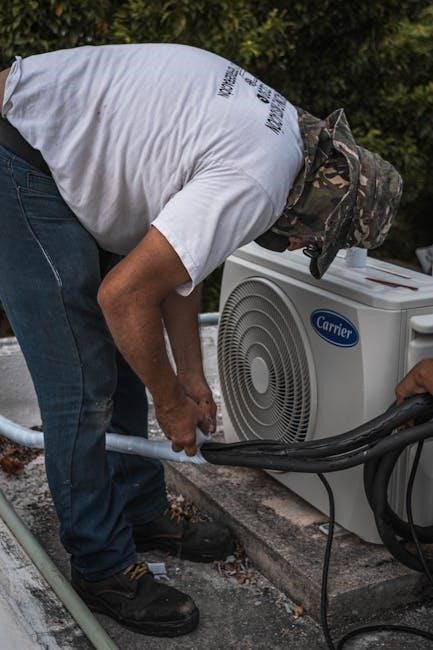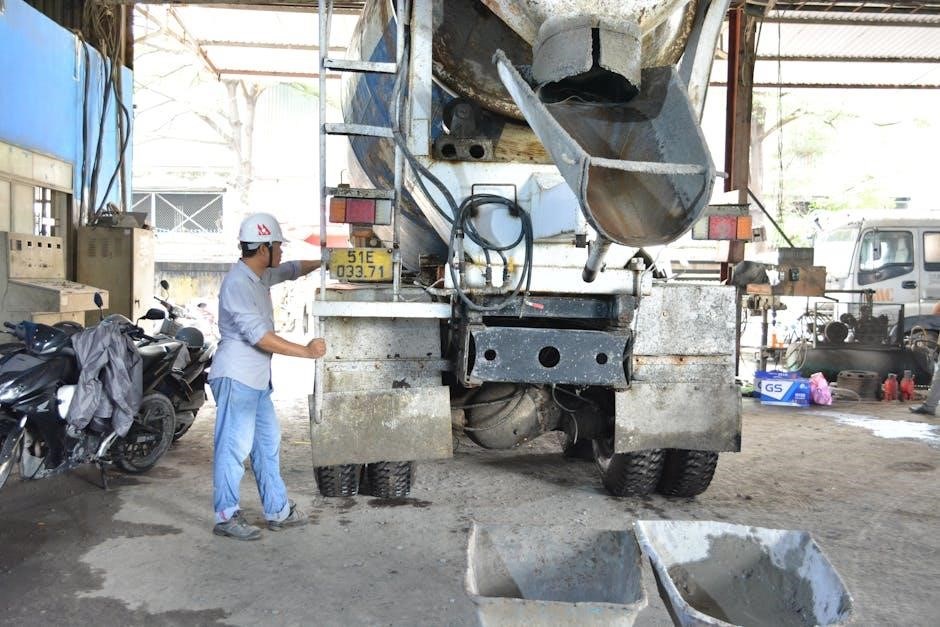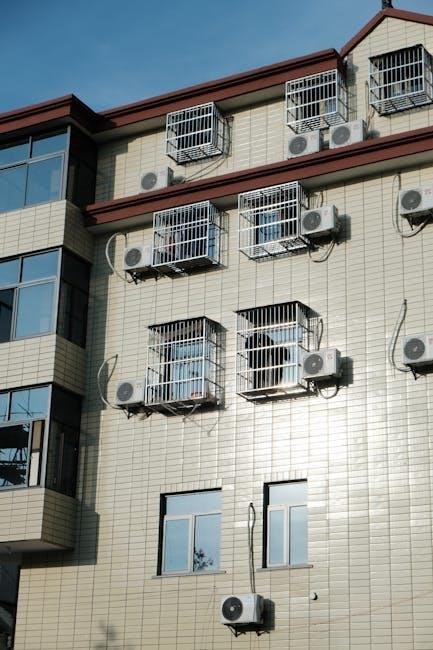An HVAC maintenance contract is a formal agreement between a contractor and client, outlining scheduled services, repairs, and terms to ensure optimal system performance and longevity.
1.1 What is an HVAC Maintenance Contract?
An HVAC maintenance contract is a written agreement between a service provider and a client that outlines the terms and conditions for maintaining HVAC systems. It ensures regular inspections, repairs, and replacements to keep heating, ventilation, and air conditioning systems running efficiently. The contract typically includes details like service frequency, payment terms, and the scope of work. This agreement helps prevent unexpected breakdowns, reduces energy costs, and extends the system’s lifespan. It is legally binding and provides clarity on the responsibilities of both parties involved.
1.2 Importance of HVAC Maintenance Contracts
An HVAC maintenance contract is crucial for ensuring the longevity and efficiency of heating, ventilation, and air conditioning systems. It helps prevent unexpected breakdowns, reduces energy costs, and ensures compliance with manufacturer warranties. By scheduling regular inspections and tune-ups, these contracts promote system reliability and optimal performance. They also provide a clear understanding of responsibilities between the service provider and the client, minimizing disputes. Investing in such a contract is essential for maintaining indoor air quality, extending equipment lifespan, and avoiding costly repairs. It offers peace of mind and financial protection for homeowners and businesses alike.
Key Components of an HVAC Maintenance Contract
A comprehensive HVAC maintenance contract includes scope of services, payment terms, service frequency, response times, contract duration, and renewal options, ensuring clarity and mutual understanding for all parties.
2.1 Scope of Services
The scope of services in an HVAC maintenance contract outlines the specific tasks and responsibilities of the contractor. These typically include routine inspections, cleaning of HVAC components, filter replacements, and diagnostic checks. Some contracts may also cover repairs or replacements of faulty parts, ensuring the system operates efficiently. Clearly defining these services helps prevent misunderstandings and ensures that both parties are aligned on expectations. It also specifies what is excluded, such as major overhauls or upgrades, which may require separate agreements. A well-defined scope ensures the HVAC system receives the necessary care to maintain optimal performance and longevity.
2.2 Payment Terms and Schedules
Payment terms and schedules in an HVAC maintenance contract detail the financial obligations of the client. These typically include fixed fees for routine services, payment methods (e.g., credit card, bank transfer), and due dates. Schedules may outline monthly or annual payments, with discounts for long-term commitments. Some contracts offer flexible billing options, such as upfront payments or installments; Penalties for late payments are often specified to ensure timely settlements. Clear payment terms ensure smooth transactions and maintain a positive contractor-client relationship. Transparency in pricing and billing is essential to avoid disputes and build trust.
Service frequency and response times are critical components of an HVAC maintenance contract. Regular maintenance visits are typically scheduled seasonally or bi-annually to ensure optimal system performance. Response times are often guaranteed, with emergency service options available for urgent repairs. Priority service may be offered to contract holders, reducing wait times during peak seasons. These details ensure that clients receive consistent and reliable support, minimizing system downtime and extending equipment lifespan. Clear terms for service frequency and response times help set expectations and foster a trustworthy relationship between contractors and clients. Contract duration and renewal options outline the length of the agreement and terms for extending services. Fixed-term contracts typically range from one to five years, providing stability for both parties. Auto-renewal clauses may be included, ensuring continuous service without gaps. Termination clauses specify conditions under which either party can end the contract. Renewal options often require advance notice, allowing clients to review and adjust terms. These provisions ensure long-term maintenance support while offering flexibility for future needs. Clear terms for duration and renewal promote transparency and mutual understanding between contractors and clients. An HVAC maintenance contract offers regular system checks, reducing unexpected repairs and extending equipment life. It ensures optimal performance, energy efficiency, and cost savings through preventive care. An HVAC maintenance contract provides homeowners with peace of mind by ensuring their heating and cooling systems operate efficiently. Regular maintenance reduces the risk of sudden breakdowns, saving money on costly repairs. Homeowners benefit from extended equipment lifespan, lower energy bills due to optimized performance, and consistent indoor comfort. Contracts often include priority service, faster response times, and access to exclusive discounts. This proactive approach safeguards their investment, enhances home safety, and ensures reliable climate control year-round. HVAC maintenance contracts offer contractors predictable income streams through recurring service agreements. These contracts enable contractors to plan and schedule maintenance visits efficiently, reducing last-minute emergencies and optimizing resource allocation. They also foster long-term customer relationships, increasing loyalty and the likelihood of referrals. Contractors can showcase their expertise, enhancing trust and credibility. Additionally, contracts provide a framework for clear communication of services and pricing, minimizing disputes and ensuring mutual understanding. This structured approach allows contractors to deliver consistent, high-quality service while growing their business sustainably. Selecting the right HVAC maintenance plan involves evaluating service scope, payment terms, and contractor reputation, ensuring it aligns with your system needs and budget requirements effectively. When evaluating an HVAC maintenance plan, consider the scope of services, including routine inspections and repairs. Check payment terms and schedules, ensuring clarity on costs. Assess service frequency and response times to meet your needs. Review contract duration and renewal options to avoid lengthy commitments. Research the contractor’s reputation and reviews to ensure reliability. Verify if the plan covers emergency services and parts replacement. Ensure the agreement aligns with your HVAC system’s specific requirements and budget constraints. Finally, look for flexibility to customize the plan according to your preferences and priorities. Be cautious of contracts with vague terms or hidden fees, as they can lead to unexpected costs. Avoid agreements that lack flexibility or penalize cancellations, trapping you in unfavorable terms. Steer clear of contractors with poor reputations or unclear service histories, as this may indicate unreliable work. Watch for contracts that exclude essential services or require upfront payments without guarantees. Be wary of agreements with unclear termination clauses or automatic renewals that are difficult to exit. Ensure the contract clearly outlines responsibilities and expectations to avoid disputes or subpar service. Contractual obligations define the responsibilities of both contractors and clients, ensuring clarity on services, payments, and expectations to maintain a smooth working relationship throughout the agreement. Contractor responsibilities in an HVAC maintenance contract typically include performing scheduled maintenance, repairs, and inspections to ensure the system operates efficiently. They must use qualified personnel and genuine parts, adhering to industry standards. Contractors are also expected to respond promptly to emergencies and honor the agreed service frequencies. They should provide detailed reports of services performed and communicate any necessary repairs or upgrades. Additionally, contractors must maintain proper insurance and licenses, ensuring compliance with local regulations. These obligations ensure the client receives reliable, professional service, safeguarding their HVAC system’s performance and longevity. Customer responsibilities under an HVAC maintenance contract include timely payment of agreed fees, providing access to the HVAC system for scheduled services, and reporting any issues promptly. Customers must maintain the system according to the contractor’s recommendations and avoid unauthorized modifications. They are also expected to adhere to the agreed service schedule and notify the contractor of any changes in system usage or operational needs. By fulfilling these obligations, customers ensure smooth service delivery and optimal system performance, aligning with the contractor’s efforts to provide reliable maintenance and support. Use templates to streamline the process, ensuring all terms, schedules, and payment details are clearly defined for a legally binding and customizable agreement. Start by using a template to save time and ensure compliance. Define the scope of services, payment terms, and service schedules clearly. Include client responsibilities and expectations to avoid disputes. Specify the duration and renewal terms, ensuring both parties understand the agreement. Add a section for signatures to make it legally binding. Finally, review the contract with a legal expert to ensure all terms are enforceable and protect both parties. This structured approach ensures a comprehensive and clear agreement tailored to specific needs. Digital tools like PandaDoc and Jotform simplify HVAC maintenance contract creation. They offer customizable templates, e-signature features, and cloud storage for easy access. These platforms allow users to fill out and sign agreements from any device, streamlining the process. Contractors can quickly generate professional-looking contracts with pre-built templates, ensuring consistency and compliance. Digital tools also reduce errors and save time, enabling faster agreement execution. They provide a secure and efficient way to manage contracts, enhancing collaboration between contractors and clients. These tools are essential for modern HVAC businesses aiming to improve workflow and customer satisfaction. When drafting an HVAC maintenance contract, avoid vague service scopes and unclear payment terms, as they can lead to disputes. Neglecting to include termination clauses or renewal options may result in unexpected obligations. Failing to outline response times and service frequencies can cause delays. Overlooking customer responsibilities, such as system accessibility, may void contract benefits. Ensure all terms are clearly defined to avoid misunderstandings. Neglecting to use digital tools for contract creation can lead to inefficiencies. Always review the agreement thoroughly to prevent errors and ensure compliance with legal standards. Preventative maintenance is a proactive approach to ensure HVAC systems operate efficiently and reliably. Regular inspections, cleaning, and part replacements help reduce unexpected breakdowns and extend system lifespan. By addressing potential issues early, maintenance plans minimize repair costs and downtime. This approach also improves indoor air quality and energy efficiency, benefiting both residential and commercial settings. A well-structured maintenance plan is essential for maintaining optimal performance and ensuring customer satisfaction. It is a cornerstone of any effective HVAC maintenance contract, providing long-term benefits for both contractors and clients. Case studies highlight the effectiveness of HVAC maintenance contracts, showcasing benefits like cost savings, improved efficiency, and reduced downtime across residential and commercial applications. A residential HVAC maintenance contract ensured consistent system performance for a homeowner in Ohio. Regular tune-ups and priority service reduced energy bills by 15% and prevented unexpected breakdowns. The structured agreement provided peace of mind, while the contractor benefited from steady, recurring revenue. This case demonstrates how tailored maintenance plans can enhance customer satisfaction and operational efficiency, making them a win-win for both parties involved. Such success stories underscore the value of proactive HVAC care in residential settings. A commercial HVAC maintenance contract with a Central Ohio business ensured seamless system operation. Regular inspections and proactive repairs minimized downtime, saving the company thousands in potential losses. The tailored agreement included priority scheduling and discounted rates, enhancing the client’s bottom line. The contractor gained a loyal customer and consistent revenue stream. This partnership highlights how structured maintenance plans can boost operational efficiency and satisfaction in commercial settings, while reinforcing the importance of customized service agreements for businesses relying on HVAC systems year-round. Future trends in HVAC contracts emphasize smart technology integration, energy efficiency, and sustainability. IoT-enabled systems and remote monitoring will become standard, allowing real-time diagnostics and proactive maintenance. Contracts may include energy-efficient solutions and renewable energy integration. Flexible payment options, such as performance-based pricing, are expected to rise. Additionally, there will be a greater focus on eco-friendly practices and compliance with environmental regulations. These advancements aim to enhance system performance, reduce costs, and align with global sustainability goals, shaping the next generation of HVAC maintenance agreements. When negotiating an HVAC maintenance contract, clarity and mutual understanding are key. Ensure all terms, such as service frequency and response times, are clearly defined. Prioritize your needs, whether it’s cost, service quality, or flexibility. Request detailed breakdowns of services and costs to avoid hidden fees. Don’t hesitate to ask for adjustments or additional services. Consider the contractor’s reputation and customer reviews to gauge reliability. Finally, ensure all agreed terms are documented in the contract to prevent disputes. A well-negotiated agreement benefits both parties, fostering long-term partnerships and system reliability. An HVAC maintenance contract is a vital tool for ensuring system efficiency, reliability, and longevity. By outlining clear terms, services, and responsibilities, it fosters trust and accountability between contractors and clients. Regular maintenance not only prevents costly repairs but also enhances comfort and energy savings. As the industry evolves, digital tools and preventive strategies are becoming essential. Whether for residential or commercial use, a well-structured HVAC maintenance contract offers peace of mind and long-term benefits for all parties involved, making it a cornerstone of modern HVAC management.2.3 Service Frequency and Response Times
2.4 Contract Duration and Renewal Options

Benefits of Having an HVAC Maintenance Contract
3.1 Benefits for Homeowners
3.2 Benefits for Contractors
How to Choose the Right HVAC Maintenance Plan
4.1 Factors to Consider
4.2 Red Flags to Avoid
Understanding Contractual Obligations
5.1 Contractor Responsibilities
5.2 Customer Responsibilities
How to Create a Custom HVAC Maintenance Agreement
6.1 Steps to Draft a Contract
6.2 Using Digital Tools for Agreement Creation

Common Mistakes to Avoid

The Role of Preventative Maintenance
Case Studies
9.1 Residential Contract Success
9.2 Commercial Contract Success
Future Trends in HVAC Contracts

Negotiation Tips
